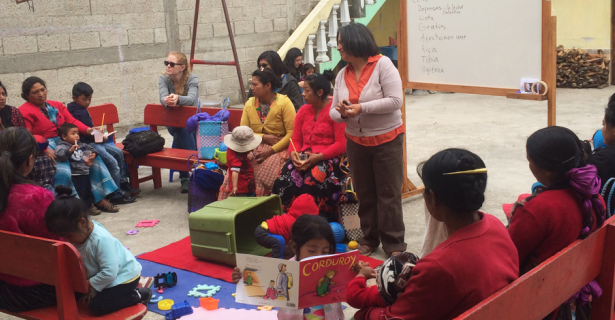The second half of the work I did with Pop Wuj rapidly came to an end. After adjusting to the lifestyle and pace in Xela, Guatemala, with the occasional earthquake shock and parasite challenges, the days packed with morning clinic and afternoon classes flew by.
The Nutrition Program was an especially involved project. Malnutrition previously had been under-examined in Guatemala due to a cultural assumption that Mayan people were “naturally” shorter than their Mestizo counterparts. This assumption has since been challenged, as research has found the height discrepancy to be due to insufficient nutrition, leading organizations like Pop Wuj to step in and try to prevent chronic childhood malnutrition through educational outreach and providing dietary supplements. The Nutrition Program at Pop Wuj seems to be one of the most important projects; the chronic diseases that many of the Pop Wuj patients are seen for (diabetes, hypertension, and gastritis) have origins in malnutrition. By combating malnutrition in children, lifetime health will improve.
I accompanied the Nutrition Program to Llanos del Pinal, a rural community close to Xela. Pop Wuj visits every three weeks to keep mothers consistently supplied with nutritional supplements and access to pediatric healthcare. We began by recording the weight and height of all the babies (6 months through 3 years, the time when malnutrition intervention is most critical). While the mothers gather to discuss that week’s topic with the program leader – this week, why breastfeeding is important and how to introduce other balanced foods – we compare our measurements to weight, height, and age charts, determining the degree to which each child is underweight or stunted in growth. This information will inform the Nutrition Program as to how best to treat each child. Despite the continuity of the Nutrition Program, most children are moderately to severely underweight and stunted. The program absolutely has successes – heights and weights do improve and mothers almost always return – but I am interested in seeing how the program will evolve. Working with Timmy Global Health, Pop Wuj is specifically assessing this program’s efficacy. The program fills an essential void in healthcare, but how can a more permanent solution become a part of the nutrition clinic’s mission?
We returned to the same community later that week to run a general health mobile clinic. Mobile clinics operate much like the clinic Pop Wuj has on-site in Xela; patients have histories and vitals taken to add to their health profile in the online system, are seen by a doctor, and receive prescriptions. On this day, there was the added challenge of treating children without their parents present. A national holiday meant that children had no school, but adults could not afford to take time off from their agricultural work to accompany their children to the clinic. Grade-school children therefore lined up with their smaller siblings in tow. Most were simple well visits, after which children received vitamins and a routine albendazole anti-parasite treatment. The children all remembered how vitamins worked (“¡Sólo una, cada día!”). Mobile clinics are a way to overcome the barriers to accessing healthcare that Xela’s most vulnerable populations face, but the current model should be continually critiqued and evolved.
It was heartening to see how many students traveled to Pop Wuj while I was there. Medical students, nurses, and residents came from all over the states to offer their skills. Volunteers gain a lot of benefit from coming to Pop Wuj, and their participation, in turn, benefits Pop Wuj’s programs. Pop Wuj’s entirely Guatemalan ownership and allocation of all money to its social endeavors supports the reliability and sustainability of its model, but the dynamics of international volunteering should not be forgotten. The abundance of volunteers demonstrates that Pop Wuj works; volunteers become invested in a community that had previously been entirely foreign to them, spread the word of these experiences upon returning home, and inspire more volunteers and donations to return to Pop Wuj. And this is what I will be doing, too. How I bring back and represent the knowledge and experiences I have had at Pop Wuj is important. What Tufts students and community members know about being a part of the Tufts Timmy brigade team or donating medicines will be determined in part by my account. All of those involved with Pop Wuj encouraged me to share my experiences after I leave – what inspired me, what more could be done, and why Jumbos should (and do) make the effort to become closer to a community that is geographically so far away.

